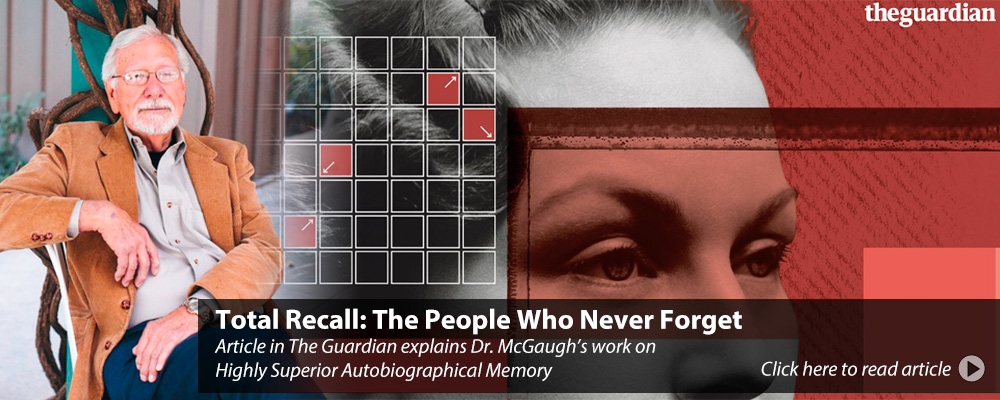Article in The Guardian explains Dr. James McGaugh’s work on Highly Superior Autobiographical Memory (HSAM)
Original article written by Linda Rodriguez McRobbie in The Guardian. Click here to read.
Almost 17 years ago, in June of 2000, Dr. James McGaugh met the woman that would inspire a new area of research in his laboratory and expose a novel mystery of the mind. Can you imagine remembering every detail of every event that happened in your life?
“If you ask Jill Price to remember any day of her life, she can come up with the answer in a heartbeat” Dr. McGaugh was intrigued. He had “spent his professional career studying strongly formed memories, and Price seemed to have the strongest memories he had ever encountered.”
With his team of researchers that included neuropsychologist Dr. Elizabeth Parker as well as neurobiologist and CNLM Faculty Fellow Dr. Larry Cahill, Dr. McGaugh aimed to “determine the depth and breadth of [Price’s] memory.”
“Over time, it became clear that Price’s autobiographical memory was potentially unprecedented. But when it came to remembering details that did not relate to her personally, Price was no better than average.”
A few years after their first meeting, the team published their first findings “A Case of Unusual Autobiographical Remembering,” which was published in the neuropsychology journal Nerocase in February 2006. Very soon after describing hyperthymesia, or Highly Superior Autobiographical Memory (HSAM) to the world, Dr. McGaugh began receiving many contacts from individuals who thought they also had superior memory abilities. “It is a measure of just how rare HSAM is that by 2011, even after millions of people had heard about it, researchers had identified only 22 people with the condition.”
Twelve years after the initial meeting between Price and Dr. McGaugh, neurobiologist Dr. Craig Stark and then graduate student Aurora LePort published a follow-up paper in the journal Neurobiology of Learning and Memory. This paper, “the second published on the subject, established that Price and the 10 others in the study were not just high achievers on a spectrum of ‘good’ to ‘bad’ memory, they were in a separate outlying class by themselves. The HSAM subjects turned out to be far better than people with average memories at recalling long-past autobiographical data; in memories that coulee be verified, they were correct 87% of the time. And the paper was able to offer some clues as to why they could do what they do.”
Center for the Neurobiology of Learning and Memory Faculty Fellows Drs. McGaugh, Stark and Yassa currently all have active research projects aimed to understand Highly Superior Autobiographical Memory.
Click here to read article in The Guardian

